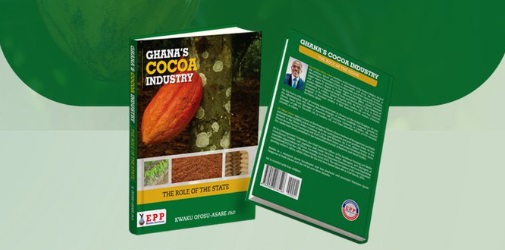
Dr Ofosu-Asare launches book on cocoa industry
A book that attempts to examine the country’s cocoa industry through the lens of state support to the sector has been launched in Accra.
Titled, “Ghana’s Cocoa Industry: The Role of the State”, the 242-page book relies on primary data sources, mainly interviews from more than 800 cocoa-growing towns, villages and hamlets to make a case for farmers.
Beyond that, the author, Dr Kwaku Ofosu-Asare, whose parents were cocoa farmers, points readers to the history of cocoa discovery in the world while highlighting the resilience of smallholder farmers amid challenges in the sector and how the state can better support the sector’s expansion.
Other areas covered in the book include the role of marketing boards in the industry, characteristics of the country’s cocoa farmers and sizes, the role of the state in ensuring higher cocoa prices, some intervention measures by successive governments such as the introduction of the HI-TECH initiative by former President John Agyekum Kufuor to enhance cocoa production, the role of COCOBOD, Ghana’s efforts to embrace globalisation among other interesting themes.
Launch
The Minister of Youth and Sports, Mustapha Ussif, launched the book on behalf of President Nana Addo Dankwa Akufo-Addo at a ceremony in Accra last Wednesday.
The first two copies of the book were sold for GH¢100,000 each at the occasion which was chaired by the Chancellor of the University of Professional Studies, Accra (UPSA), Dr Kofi Koduah Sarpong.
Mr Ussif highlighted the enormous contribution of cocoa to the economy.
As such, he said the state had an important role to play in ensuring the survival and growth of the cocoa industry, adding that the book comes in handy to support the government’s efforts in the sector.
“Considering the calibre of Dr Ofosu-Asare, I am very confident that this book will provide key insights and recommendations to the state to guide our efforts in enhancing the development of our cocoa industry,” he said.
Inspiration
On what inspired him to write the book, Dr Ofosu-Asare, who is also the Executive Chairman of the 13th African Game, explained that his experiences in the cocoa farm as a young boy kept ringing in his ears, hence the decision to write about cocoa.
He disclosed that data gathered from over 80 farmers indicated that more than 60 per cent of the farmers were above 60 years old, a situation which could affect the industry negatively if efforts were not made to woo the youth into the sector.
He mentioned poor social amenities in the cocoa-growing areas as some of the factors discouraging cocoa farmers from expanding their production.
The author added that a major finding of his book was that cocoa farmers did not see the annual increment in cocoa prices as a motivating factor.
Instead, he said initiatives such as the supply of seedlings, mass spraying, a surplus of fertiliser, payment of bonuses, and provision of hybrid seedlings all combined with the annual increase to send a motivating factor.
“To the cocoa farmer, you haven’t done anything if you increase cocoa price. Because cocoa farmers think that they have been cheated over the years and they are not getting the right amount of money from sell the cocoa on the global market.
“The key finding was that the cocoa farmer will feel motivated when you increase the price and put in intervening measures such as mass spraying, and give them hybrid seedlings to plant, among others,” he said.
Dr Ofosu-Asare said Tetteh Quarshie, the agriculturalist credited by history as the man directly responsible for introducing cocoa to the crops of the country had not been celebrated.
The Head of the University of Ghana School of Agriculture, Professor Daniel Bruce Sarpong, who reviewed the book, described it as the first to take on the role of the government in the cocoa industry.
